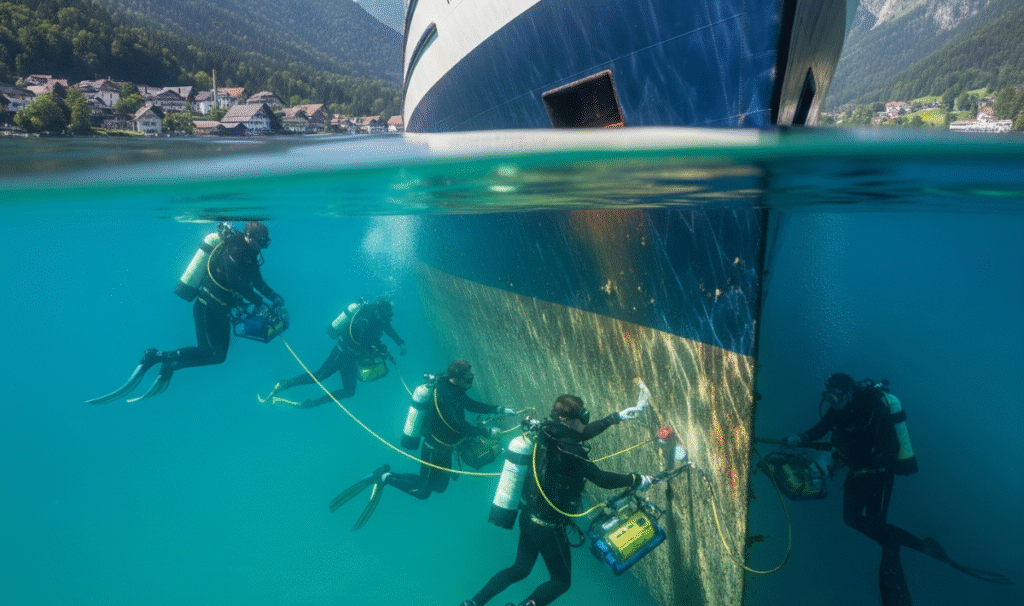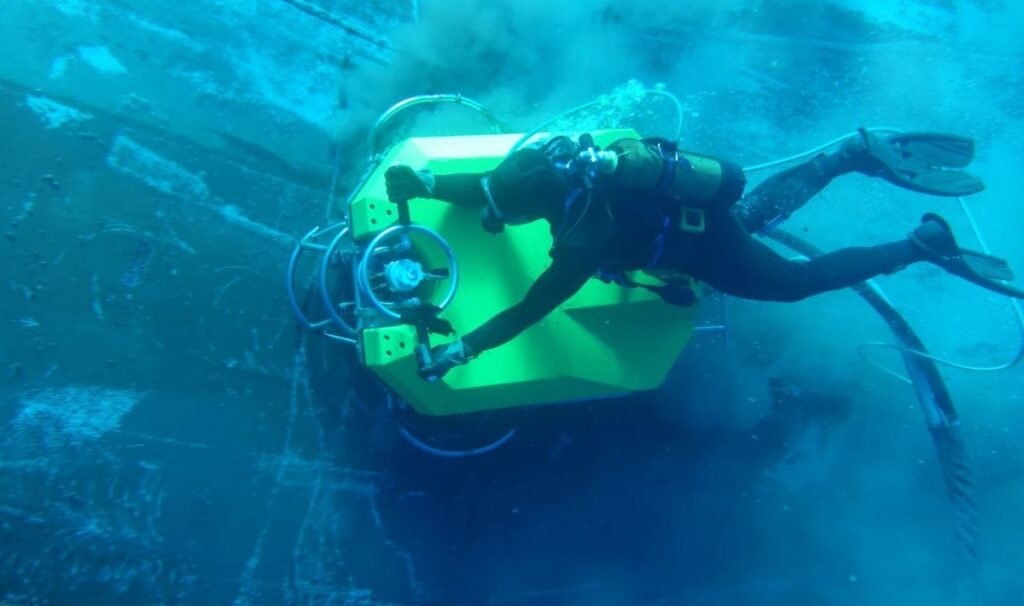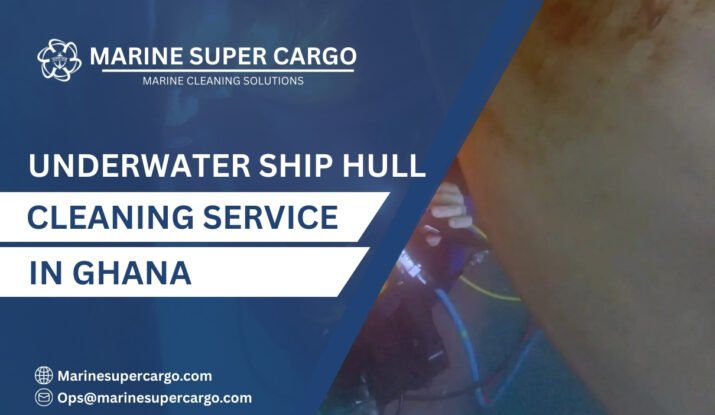Beneath the sun-kissed waves of Ghana’s coastline, life is teeming, ships are bustling—and something surprising is unfolding. If you’re a shipowner, port official, or just passionate about maritime health, you may not realize what’s truly at stake beneath the waterline. Today, let’s unlock the underwater ship hull cleaning in Ghana—because sometimes what we can’t see could cost us the most.
Picture this: your vessel lies anchored in the Gulf of Guinea, crew busy with paperwork, yet below, a silent army of barnacles and algae invades the hull. It’s a hidden battle every ship faces, but few talk about. Why? Because both the solution—underwater ship hull cleaning in Ghana—and the risks are surprisingly complex.
Let’s dive below the surface, where efficiency, safety, and environmental stewardship hang in the balance.
Why Ships Need Underwater Ship Hull Cleaning in Ghana
The hustle of Ghana’s maritime trade is relentless. With every voyage, vessels accumulate marine growth—biofouling—that can slow them down and increase fuel consumption. It’s tempting to see underwater ship hull cleaning in Ghana as a quick fix: cost-effective, less downtime, no dry-docking. But as with any shortcut, dangers are lurking just out of sight. Beyond efficiency, regular hull cleaning also supports environmental protection by reducing the spread of invasive species, helps shipowners maintain compliance with international maritime standards, and safeguards long-term vessel performance in the competitive West African shipping industry.
Environmental Contamination—Invisible Threats
Release of Pollutants and Antifouling Chemicals
When you scrub a ship’s hull underwater, you’re not just freeing up speed—you could also be releasing toxic paint flakes, heavy metals, and lingering antifouling agents. Many coatings are designed to poison barnacles and slime, so imagine the damage when these are unleashed into Ghana’s vibrant marine habitats.
Impact on Ghana’s Marine Ecosystem
The Gulf of Guinea isn’t just water—it’s a tapestry of fisheries, dolphins, sea turtles, and livelihoods. The very growth scraped from hulls can spread invasive species or suffocate corals and mangroves. The underwater ship hull cleaning in Ghana starts with pollution and ripples through everything, from nourishment for communities to tourist appeal.

Physical Hull Damage & Diver Dangers
Coating Abrasion, Scratches, and Structural Harm
Think of your ship’s hull coating like the paint job on a brand-new car. One careless move during underwater ship hull cleaning in Ghana can grind away protective layers, exposing metal to the warm, corrosive sea. This not only speeds up rust and pitting but also makes the next fouling problem worse, leading to a costly cycle of repair.
Diver Hazards in Ghana’s Coastal Waters
Hull cleaning is demanding work—and in Ghana’s coastal current, less-experienced divers face risks: from entanglement around propellers, poor visibility, to dangerous marine life. Equipment failure and unexpected weather shifts add yet another layer of risk during underwater ship hull cleaning in Ghana.
Regulatory & Legal Pitfalls Facing Ghanaian Operators
Did you know that Ghana has adopted international guidelines set by MARPOL and the International Maritime Organization (IMO ) to protect its coasts? Shipowners who cut corners on waste capture, record-keeping, or environmental mitigation may be caught during routine inspections. According to Cleaninship.co, fines for improper underwater ship hull cleaning in Ghana can quickly escalate, and repeated offenses risk vessel bans.
Inspections, Fines, and Vessel Detention
Port state control is real. Authorities can detain vessels pending environmental review, investigate the cleaning process, or even blacklist repeat offenders. The underwater ship hull cleaning in Ghana isn’t just theory—it’s happening right now on the Atlantic coast, impacting insurance, contracts, and shipping timelines.
Reducing the Underwater Ship Hull Cleaning in Ghana
So, how do you keep your hull—and conscience—clean? Start with the right tools and people. Always use IMCA-certified, eco-conscious cleaning crews. Schedule hull assessments before any job to ensure coatings are sound. Demand the use of closed-circuit cleaning tools that recover all fouling and capturable waste, minimizing environmental exposure during underwater ship hull cleaning in Ghana.
Lastly, keep meticulous logs of every cleaning operation, proof of regulatory compliance if ever inspected.
How International Standards Set the Bar
Role of IMCA, MARPOL, and IMO
- IMCA: Trains, certifies, and audits commercial diving operations.
- MARPOL: Prohibits the dumping of harmful substances and enforces debris recovery.
- IMO: Sets overarching guidelines for eco-protective, safe operations.
Compliance with these organizations not only reduces the underwater ship hull cleaning in Ghana, but also future-proofs investments as regulatory scrutiny grows.

Why Ghana’s Environment is Especially Vulnerable
Ghana’s unique blend of mangroves, coral reefs, and fisheries means marine ecosystems are more sensitive to change. Even small-scale leakage from cleaning operations can create destructive domino effects. Add in seasonally strong currents, shifting sandbanks, and sudden squalls, and the need for specialized local expertise in underwater ship hull cleaning in Ghana becomes clear.
Conclusion:
We’ve journeyed below the surface to reveal the underwater ship hull cleaning in Ghana—environmental contamination, hull and diver safety, and legal landmines. We all want the same thing: smoother ships, cleaner seas, and thriving businesses.
By demanding the best practices, trained crews, and strict adherence to both local and global guidelines, you position your vessel for success. Remember, safe and responsible underwater ship hull cleaning in Ghana isn’t a cost—it’s an investment in your future and our shared blue world.
FAQ:
Q1. How often is underwater ship hull cleaning in Ghana needed?
Most ships benefit from bi-annual cleaning, but traffic and trade routes may require more frequent maintenance.
Q2. Who can perform underwater ship hull cleaning in Ghana?
Only divers and teams certified by IMCA or comparable bodies, using compliant, closed-recovery equipment.
Q3. Is eco-friendly hull cleaning available in Ghana?
Yes! New technology and trained local companies use MARPOL/IMO-compliant systems for debris collection and zero-pollution cleaning.
Q4. What’s the penalty for non-compliance with cleaning regulations?
Fines, vessel detentions, and potential blacklisting from Ghana’s ports—all of which can halt operations and hurt business.
Q5. How can shipowners document responsible cleaning in Ghana?
By keeping full cleaning logs, detailed before-and-after photos, and written certification from IMCA-compliant service providers.


